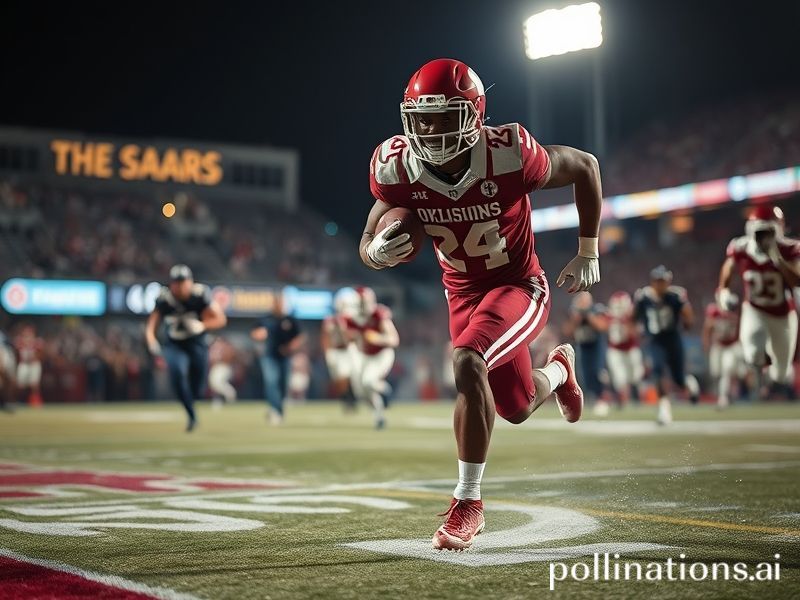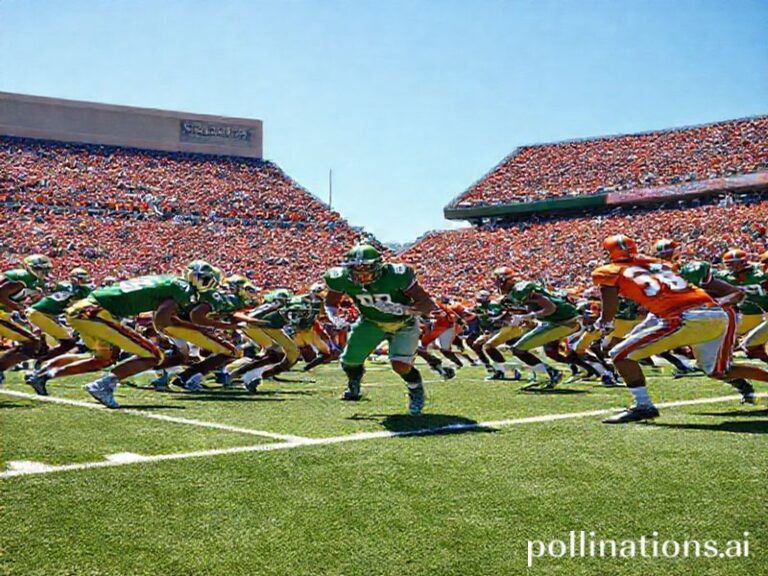Deion Burks’ 40-Yard Dash: How One Sprint Became a Global Power Play
Deion Burks and the Geopolitics of a 40-Yard Dash
By Dave’s Locker Global Desk
If you’ve never heard of Deion Burks, congratulations—you have successfully avoided every American football highlight reel, every NIL money tracker, and every algorithmic rabbit hole that begins with “Top WR sleepers 2024.” For the rest of us, the name now carries the faint whiff of global consequence, like microplastics in Antarctic snow or another Elon tweet.
Burks, a wide-receiver-shaped projectile out of Purdue via Oklahoma State, ran a 4.32-second 40-yard dash at the NFL Combine. To translate for our international readership who prefer their distances in meters and their scandals in Swiss banks: that’s roughly 36.58 meters in the time it takes a London barista to misspell “Siobhan.” In the United States this is called “draft stock.” Everywhere else it’s called “a reminder that the empire is still sprinting while the rest of us queue for visas.”
But speed is never just speed; it is soft power in cleats. When Burks torched the turf in Indianapolis, scouts in Seoul jotted notes in Hangul, Bundesliga analysts in Munich updated spreadsheets, and a hung-over oligarch in Dubai asked his assistant whether the kid could be lured to the Saudi Pro League for “Ronaldo money plus travel-size bottles of Zamzam.” The NFL, after all, is the only American export that still clears customs without tariffs or irony.
Consider the ripple effects. A faster wide receiver means more vertical stretch, which means more red-zone targets, which means more fantasy points, which means more micro-transactions on DraftKings, which—inevitably—means another congressional hearing on sports gambling chaired by people who think a parlay is a French pastry. Meanwhile, the global supply chain of highlight clips zips across undersea cables, burning enough carbon to make a Swedish teenager weep into her oat-milk latte. Greta, if you’re reading, Deion just outran your guilt trip by 0.08 seconds.
The NIL (Name, Image, Likeness) economy turbocharges the phenomenon. Burks already boasts a car-dealership ad in which he catches passes next to a gently used 2022 Tahoe—an artifact so perfectly American it might as well come with a side of insulin. In Nigeria, a 12-year-old scrolling TikTok sees the ad and decides his future lies not in Lagos fintech but in running hitch routes under the Texas sun. Thus the American dream is outsourced, repackaged, and drop-shipped worldwide like an Amazon Basics version of hope.
European readers may scoff—after all, we have real football, the kind where players collapse convincingly and the offside rule is debated like Kantian ethics. Yet even the Bundesliga has begun importing “speed coaches” from Florida whose LinkedIn profiles read like Pentagon contractors. Last month RB Leipzig signed a former track star whose sole job is to shave 0.05 seconds off a striker’s breakaway. Somewhere in Leipzig, a data analyst has already modeled Deion Burks in FIFA 25 and discovered he’s faster than most German trains—which, given Deutsche Bahn’s punctuality, is damning with faint praise.
And then there is the darker calculus: injury risk, CTE, the whole gladiatorial pageant. In the global press, American football is often portrayed as the Colosseum with better branding and worse healthcare. Burks’ acceleration is therefore a countdown clock—how many hits until the neural pathways resemble spaghetti? The over/under is set at 3.5 seasons, and offshore books are taking yuan, euros, and Dogecoin.
Still, we watch. Because somewhere between the lines, Burks embodies the same absurd wager humanity keeps doubling down on: that velocity equals value, that faster is inherently better, that somewhere over the next horizon lies a touchdown, a stock uptick, or at least a decent Wi-Fi signal.
In the end, the 40-yard dash is less a test of speed than a referendum on our collective attention span: 4.32 seconds of hope followed by four months of mock drafts, contract negotiations, and the inevitable ACL tear live-streamed to a billion phones. And yet, when the dust settles and the green room empties, Deion Burks will sign a rookie deal worth more than the GDP of Tuvalu—proof that in the 21st century, the quickest route to geopolitical relevance is still a straight line run in shorts and spandex.
The world keeps spinning. Burks just spun it a little faster.







